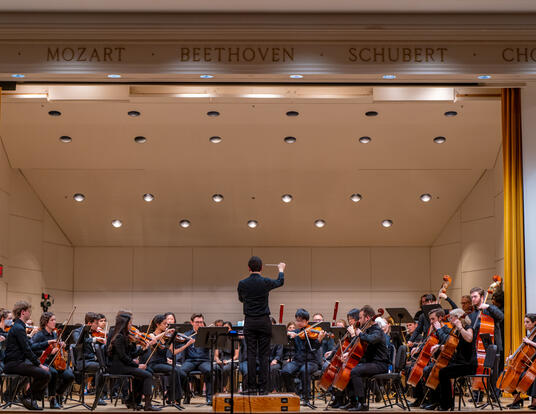B-2 B-Well: Building Better Bonds
For relational health, take time and tune in

Think back to before you started graduate school here at Harvard Griffin GSAS. You may have been thinking about long hours writing or difficult problem sets, perhaps the logistics of moving to a new city or acquiring a visa. But you may not have considered one of the greatest challenges students face—maintaining relationships (relational health).
Though yesterday was Valentine’s Day, we aren’t necessarily talking only about dating! Graduate school is a time when we may be figuring out who we are and need extra love and support. We need friends we can vent to and peers who can give us advice when we feel overwhelmed. We need faculty and advisors to succeed academically and mentors to help us chart our career paths. Engaging thoughtfully with relational health nurtures all these bonds.
Like the other dimensions of the wellness framework, relational health incorporates several concepts and suggestions. Two in particular stand out as challenges for graduate students: time management and self-awareness. These can be pivotal in improving many types of relationships, from romantic partners to lab partners.
Taking Time: Balancing People and Priorities
Graduate school students are busy—some might say impossibly so, depending on the time of year and where they are in their program. Balancing everything may feel like you’re at the center of the depiction of a biblically accurate angel, with rings branching out in every direction, all dancing up and down and bouncing you along.
Just like learning how to balance your academic responsibilities, it can take time to figure out how to balance your relationships. Partners, friends, peers, and mentors all require different degrees of effort and connection. Happily, there is a whole community of students who will go through the journey with you. Here’s advice from some of them:
- Plan ahead: “I put alone time in my calendar every week so when my boyfriend asks if I’m free on other days, I have more energy to connect with him because I’ve been taking care of myself.”
- Think creatively: “My partner and I are both graduate students and love to sit next to each other and watch reality TV while we write. It’s all about getting quality time wherever we can.”
- Leverage technology: “Google calendars! I’m polyamorous and being able to share calendars and schedules is so important for making date planning easier.”
- Manage expectations: “I try to be really clear with everyone that I’m in school right now and it’s a huge time commitment. It helps me feel less guilty when things are crazy and I don’t want to talk or hang out much, and it helps them be more understanding towards me when I can’t always put 100 percent of my energy into family or friends.”
Above all, don’t “should” on yourself. Instead of overextending to plan a long, fancy dinner date at a restaurant with your partner—or feeling guilty that you can’t—consider grocery shopping and meal prepping together. Ask your friends or peers if they are interested in setting up working groups for writing or other projects. Schedule consistent standing meetings with your advisor so you have a solid touchpoint to connect with them. In short, focus on what you can do with the time you have and the people you know.
Tuning In: Reflecting on What You Need from Your Relationships
Being able to balance and prioritize involves having a healthy knowledge of your needs and capacity. Mismatches in expectations can cause conflict. Take time to reflect on what you are looking for in relationships, both current and potential. You might find it helpful to think about the following questions:
- What is my communication style? Do I prefer more daily communication or more space?
- What are my time commitments? Am I free and flexible or busy and booked out?
- What do I love about this relationship?
- What could I change or improve about this relationship?
- What are my needs? Are they being met? Is the other person aware of them?
Without a solid understanding of ourselves, it’s harder to communicate well with others, and that puts us at a disadvantage. For example, if you and your advisor are on different pages about the direction or timeline of a project, you may both find yourselves disappointed or anxious, making it even harder to connect. Similarly, if you are slammed and struggling to keep up with household chores, letting your partner or roommate know ahead of time and asking for grace goes a long way to avoiding resentment and stress. Thinking through these questions early on and communicating upfront helps us build relationships that are aligned with our expectations and desires. It’s a win-win for everyone.
Relationship Struggles: Where to Get Help
The Office of Student Services is here to help students solve problems, practice difficult conversations, or learn about resources that might be helpful for their situation. You can also find support at:
- The Harvard Ombuds Office: A confidential resource available for anyone in Harvard’s community to voice concerns or ask questions.
- The Office of Gender Equity SHARE Team: Offers a range of support to those impacted by harm, including relationship harm.
- Title IX Resource Coordinators: Available to answer questions about issues of sexual or gender-based harassment.
Relationships are complex. There’s no time limit on when is “too soon” or “too late” to ask for help or support. An objective third party might have a new suggestion or perspective on a situation that the folks involved don’t see. It’s also important to remember that people bring varying levels of experience to their relationships. Everyone struggles in some way, and a mediator can help even the playing field and ease communication differences.
Whatever relationships you are focusing on this spring, whether with others or with yourself, don’t forget there are many people in your corner ready to support you. Take care and, as always, visit B-2 to B-Well!
Get the Latest Updates
Join Our Newsletter
Subscribe to Colloquy Podcast
Simplecast





